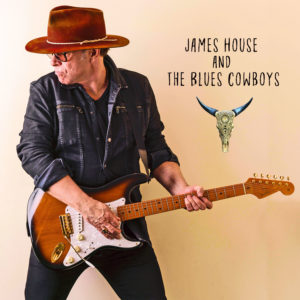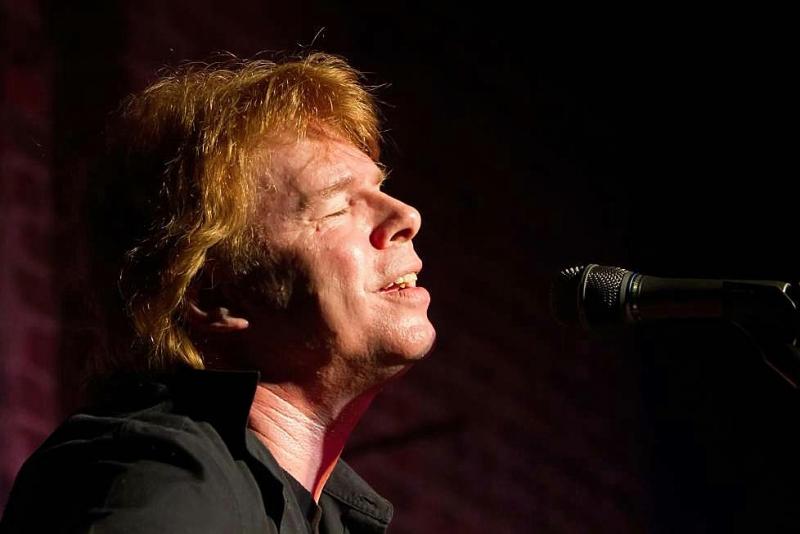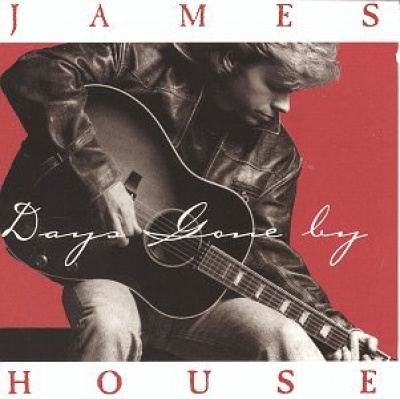Interview: James House & the Blues Cowboys Redefine Blues-Rock with New Release
I first became aware of James House when I began DJ'ing for a country music station in the Boston area; the late eighties were coming out of a new wave of young artists that had shaken up the industry. While established veterans were still making it on the charts, performers and songwriters with a more youthful bent, and with a wider range of music in their backgrounds joined them.
House was one of those; he'd already had a background in the business before he scored his first hit with "Don't Quit Me Now." He followed his self-titled album with a second, which yielded songs such as "Hard Times for an Honest Man." Days Gone By followed in 1995, with hits such as "This is Me Missing You" and "Little by Little."
This, from a California native who grew up with a broader palette of music, one House was as excited to talk about as his new band and recording, James House and the Blues Cowboys.
The ride is one in which House calls on his songwriting and musical skills to produce a driving, thoughtful record. From the eerie, guitar/keyboard opening to "Jailhouse Blues," you hear blues, rock, and country influences. "Ain't No Way" channels Albert King in the rhythm and lead licks, while "Which Side of the River" digs into that big question. House's voice sounds as youthful on the lighter, country recordings of his past, but with grit for the tougher subjects.
This is not a strictly blues album and comes out of two different sessions of songwriting. "This is a labor of love," House declared from his home outside Nashville. "I usually write in batches," he explains. "The second half is the first batch of songs that I'd written. After I'd written the first half and recorded it, I went off and did dates, and I met Will (Kimbrough). I came back and started writing the second batch of songs. I had Will on the second half of the record. It's basically a typical two-guitar, bass, drums, and a B-3. I just finished a new batch for the next record, and I'm starting a new batch as we speak.
"My process is pretty much, get inspired, write it, and I'll listen to a bunch of music in between. I've been listening to a lot of Albert Collins, and all that he brings to the table, get that big rock kind of sound. We were listening to (Led) Zeppelin along the way."
House remains optimistic and excited by the new music. "I'm having the best time," he says, "'cause I spent a lot of time in country in the 90s, and had some very good success there. The other thing with country," he adds, "is this kind of place I can't relate. It's been an amazing experience to come back to blues and to tell stories again with that music.
"Blues is in this really interesting transition, I think," House goes on. "I was at the Blues Awards last year; Buddy Guy wasn't there, but (he) is the last of that generation, so you have people like Buddy and some of the older traditional blues artists, then you had bands like Larkin Poe there and Southern Avenue. It's wide open, between traditional, and the new artists coming up. So I felt like I can do my blues. I hope people like it, and I'm having a ball."
A California native, House grew up in a musical time, but also one with a lot to choose from. Location was a big part of that. "We would go down to San Francisco," House recalls, "and catch bands like Norton Buffalo. And then I moved up to Lake Tahoe, oddly enough; and believe it or not, every act (on) the planet came through there and back when I was living there as a kid. So B.B. King would be coming for two or three weeks at a time; I was there every night to watch (him)."
The blues, House was well aware was "...the roots of all rock and roll, the Rolling Stones, and of course I loved British blues-rock. That really turned me onto the blues in the first place. Since then I've gone back, but I kind of go through phases of what I want to listen to at any time. I really loved Albert Collins, a guy named Son House, his (given) name was James. San Francisco had a lot of great bands, there was a guy Papa John Creach. A fiddle blues player, he was playing with a lot of bands out there, he sat in with everybody.
"To me, there's only two kinds of music, good and bad. The thing about the blues, it's the basis of all of it, and once you really delve into the blues you see how much the influence has come along with songs like..."

He begins singing down the phone, "Gimme one reason to stay here..." While Tracy Chapman had a folk background, that song was firmly founded in the blues. "The blues songs, it's that same pattern," House adds, "repeat the first line. Being a songwriter, I absolutely love being able to tell a story through blues music.
"I grew up in a real musical family," House continues. "Tower Records was right down the road from us, and we would go down every Saturday and get something. Singles were a dollar back then, and so we brought a lot of those home. I just fell in love with the music and everything in between. My brother brought home lots of great underground music, Quicksilver Messenger Service, it was great stuff. My dad brought great music home, too. My mother loved country; she was from Oklahoma, she loved Buck Owens. My father loved Nat King Cole, and my grandmother loved Ray Charles' country records. My wife is from Arkansas, she grew up in Helena, right across from Clarksdale, Mississippi, and her grandmother used to support the "King Biscuit Flower Hour," she used to run ads on it.
"I've just become enamored with blues, the music and all the stories, the south is a real interesting place, between here and Memphis. Clarksdale is the birthplace of a lot of incredible music...that's why I love being down in Nashville."
House's beginnings in the business were not country, but the journey brought him to Music City. "I was living in Los Angeles, " he explains, "I had a rock deal on Atlantic, and before that, I was on Warner Brothers, had a band called Prisoner. After that, I was living in LA, writing songs, (and) I had done a bunch of soundtracks for movies."
The new country movement of the mid-80s was a vital time for younger artists such as Steve Earle, Dwight Yoakam, Foster & Lloyd and the Sweethearts of the Rodeo to make their move on the industry, and the charts. "This whole country movement was happening," House recalls. "Los Angeles is really a film town, always has been. I went into the studio and cut some songs and gave them to my publisher, (and) I got signed to MCA Records. I packed up everything and move from Beverly," he chuckles, "to Nashville."
House recorded two albums for MCA Nashville. His self-titled debut produced "Don't Quit Me Now," which made it to #25 on the country charts. Hard Times for An Honest Man followed in short order. Subsequent singles, including "That'll Be the Last Thing," did not crack the Top 40.
"I was lucky enough to write hits for some other people, and that kept me in the game," House says.
House's songs stuck. Yoakam took "Ain't That Lonely Yet" to #2 on the charts, while Diamond Rio also made that spot with "In a Week or Two." House moved to Epic Records in 1994, and recorded Days Gone By. "Little by Little" went to #25, and "This is Me Missing You" broke big, partly due to its appearance on the soundtrack to The Cowboy Way. Still not done, Martina McBride took "A Broken Wing" to #1, and was nominated for Song of the Year.
If getting a contract with a record label seems daunting, making it as a songwriter may be the tougher road. "That's what a publisher does for you," House says. "I was signed to Sony and MCA, they would just allow me to write. (Lately) it all comes through producers. I'm writing directly with the artists; that is really the way these days pretty much the only way. The other way is a lottery, just throwing it out."
House also noted that if someone knows you, they tend not to forget. "People connections," he goes, on, 'it's just word of mouth, and songwriters have highs and lows. It's a small town, a small business really. Everybody knows, we're all connected in some way. So at any given time, there's only so much room for people to break through. I tell new artists coming to town, I showed them a door to the house, there's 10,000 people trying to get through that door at one time, and one or two sneak through. It's always been that way, especially these days with people putting their stuff out there. Good stuff always rises, the cream rises; music finds its way."
House speaks further about the new country movement, which had "...a couple of things factored in there. People were trading out their vinyl for CDs, and that kind of inflated the numbers. Give you a good example: my CD, Days Gone By sold 230-thousand units, and I got dropped because I didn't sell gold. If you sell 225-thousand now, you're the Beatles, that's how inflated it was back then."
As for the youth and pop-oriented country that has mostly taken over the industry since the early 90s, House says, "Any time that happens, stuff gets very popular, Madison Avenue comes in. It's always been a trend in business, you know the British Invasion, all the trends in music, they want to jump on that bandwagon. Oddly enough, that was a really great time in country music, from about '87 to '95, really a beautiful time. They call it 90s country, but it was just enough of the traditional, but we were bringing a little rock into it, kind of going back to the 70s, what the Eagles had already done beforehand, Poco and bands like that.
"I still get calls for Days Gone By," House adds, "so I still get people trying to book me on that one song. I'd gone over to Europe about seven, eight years ago. I got an email that said, 'Your song is #1 over here.' I asked who cut it, he said, 'No, it's your version.' This is twenty years after the record had come out."
That tour was a sellout, by the way.
House is coming off a tour of Europe, plus a few selected dates in the US while he prepares for the Blues Cowboys followup. "For me, I've just found my whole musical universe has opened up again paying blues," House says. "It's hard to describe. The acoustic guitar, I haven't picked it up in forever; it's all on my Stratocaster. Now I've got my Strat out, my 335, and it's whole 'nother ball game, it's a lot of fun.
"The European stuff was booked about a year ago, so that's basically on my country stuff so I'm using a European band, and seven or eight of the songs off the new album. I do some stuff I wrote with Joe."
So prepare for another album from James House and the Blues Cowboys very soon. House has weathered a career of ups and downs, but it's hardly a typical one. To the question of how he would like to be remembered, he replies, "I remember being in a helicopter with the Beach Boys one time, and Mike Love said to me, 'If we go down you're gonna be a footnote, you know that.' Made me laugh. I'd like to be known that was somebody who was dedicated, loved music, wrote a few good songs, and a good dad."
https://www.jameshousemusic.com/
http://www.songwritingwithsoldiers.org/the-songwriters/james-house/
Top Photo Credit, thanks to Ditty TV
Comments
Videos

